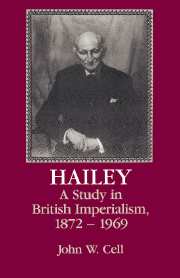Book contents
- Frontmatter
- Contents
- List of abbreviations
- Glossary of foreign words
- Preface
- 1 Early life
- 2 Colonization officer, 1901–1906
- 3 From Sargodha to Delhi, 1907–1912
- 4 Chief commissioner of Delhi, 1912–1918
- 5 A report on the Punjab
- 6 Finance member, 1919–1922
- 7 Home member, 1922–1924
- 8 Governor of the Punjab: the Sikhs, 1924–1925
- 9 Governor of the Punjab: the communal problem, 1924–1926
- 10 Governor of the Punjab: the communal problem, 1927–1928
- 11 Governor of the United Provinces, 1928–1930
- 12 Governor of the United Provinces: civil disobedience and Round Table Conference, 1930–1931
- 13 Governor of the United Provinces: 1931, year of crisis
- 14 Governor of the United Provinces: winding down, 1932–1934
- 15 Surveyor of Africa, 1935–1939
- 16 Two missions to Africa, 1939–1940
- 17 A report and a vision, 1941–1942
- 18 Adviser and propagandist, 1942–1945
- 19 Indian partition and the onset of African decolonization, 1945–1949
- 20 Defender of the faith, 1949–1969
- Bibliography
- Index
18 - Adviser and propagandist, 1942–1945
Published online by Cambridge University Press: 12 October 2009
- Frontmatter
- Contents
- List of abbreviations
- Glossary of foreign words
- Preface
- 1 Early life
- 2 Colonization officer, 1901–1906
- 3 From Sargodha to Delhi, 1907–1912
- 4 Chief commissioner of Delhi, 1912–1918
- 5 A report on the Punjab
- 6 Finance member, 1919–1922
- 7 Home member, 1922–1924
- 8 Governor of the Punjab: the Sikhs, 1924–1925
- 9 Governor of the Punjab: the communal problem, 1924–1926
- 10 Governor of the Punjab: the communal problem, 1927–1928
- 11 Governor of the United Provinces, 1928–1930
- 12 Governor of the United Provinces: civil disobedience and Round Table Conference, 1930–1931
- 13 Governor of the United Provinces: 1931, year of crisis
- 14 Governor of the United Provinces: winding down, 1932–1934
- 15 Surveyor of Africa, 1935–1939
- 16 Two missions to Africa, 1939–1940
- 17 A report and a vision, 1941–1942
- 18 Adviser and propagandist, 1942–1945
- 19 Indian partition and the onset of African decolonization, 1945–1949
- 20 Defender of the faith, 1949–1969
- Bibliography
- Index
Summary
Although Hailey's broadcast after the fall of Singapore did not minimize the military disaster, others drew still more sweeping conclusions. British prestige in Asia, it was said, the hegemony on which the power of men like himself had always rested, had gone forever. Under U.S. leadership, the American columnist Walter Lippmann wrote self-righteously, the Western allies must identify themselves with the Asian struggle for freedom, put off the white man's burden, and purge themselves of the moral taint of imperialism. Whereas the peoples of Burma and Malaya had offered scant resistance, a combined American–Filipino army was still holding out in the Philippines. To Lippmann the difference was obvious. The Americans had set a date for independence.
Did Singapore really demonstrate the failure of civil as well as military policy? asked Hailey soberly in the House of Lords. The fact that a Filipino army was still fighting proved no more than that the Americans had been shrewd enough to train it. The British in India, the French, even the Germans in Tanganyika had done that. Yet the charge that colonial governments had failed to sink roots into the life of the country, as a Times editorial had put it, was not easy to dismiss. Those who made it were not thinking of mere acquiescence – obedience to laws, payment of taxes – but of the sort of heroism displayed in the national resistance of the Chinese, Greek, or Russian peoples.
- Type
- Chapter
- Information
- HaileyA Study in British Imperialism, 1872–1969, pp. 266 - 281Publisher: Cambridge University PressPrint publication year: 1992
- 1
- Cited by



